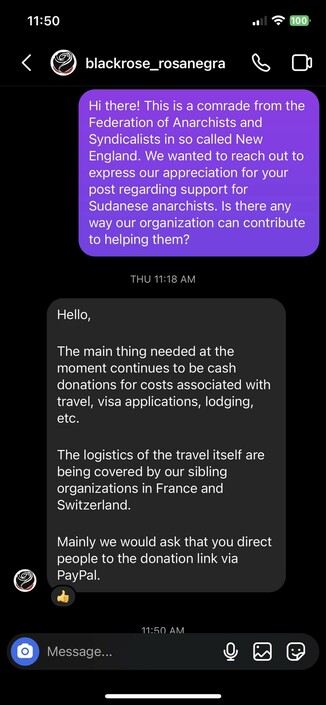Bella Ciao appreciator · @comebackkid44723
348 followers · 836 posts · Server kolektiva.socialPlease share and spread everywhere in support of evacuating Sudanese comrades!
https://blackrosefed.org/international-statement-support-sudanese-anarchists-in-exile/
https://www.paypal.com/donate/?hosted_button_id=AEFSQKQKKPQX2
#anarchism #solidarity #international #Internationalism #internationalisme #MutualAid #popularpower @HeavenlyPossum @RD4Anarchy @Air_Quotes_Comedian
#anarchism #solidarity #international #Internationalism #internationalisme #MutualAid #popularpower
Usufruct Collective · @usufructcollective
131 followers · 24 posts · Server kolektiva.socialThe strategy of communalist assemblies is to build dual power against capitalism, statecraft, and hierarchy more broadly by using communalist means, structures, and processes to develop communalist ends. Communalism involves oppositional politics and direct action–opposing that which ought not exist and taking action without being mediated by hierarchy within one’s own organization. Another dimension of communalism is reconstructive politics and mutual aid–developing social freedom and meeting people’s needs through horizontalist organizations and actions that pool skills, tools, needs, abilities, resources on various scales and creating alternative institutions and infrastructure. Another important goal is popular education–internal and external to communal assemblies. It is important to create a form and content of communalism and that requires convincing people through reasoning of libertarian socialist practices–such as direct democracy and non-hierarchy (which is distinct from getting people to agree with libertarian socialism as a belief system). A good way to convince people is to focus together on common needs, common goals, and common struggles and to use argumentation for why horizontalist self-organization, mutual aid, and direct action etc. can help arrive at various goals people have better than other means (such as hierarchical ones) and why libertarian socialist methods (direct democracy, mutual aid, direct action, etc.) are more ethical and effective at arriving at various goals that people value.
Communalist assemblies and embedded pariticipatory councils can develop oppositional and reconstructive politics at the points of extraction, production, distribution, reproduction, consumption, and community life. Community assemblies and embedded councils can develop, help with, and participate in many different kinds of oppositional and reconstructive politics. This includes everything from direct action such as occupations of hierarchical infrastructure, full on expropriation of land, means of production and fruits of labor, civil disobedience, rallies, strikes, blockades, boycotts, insurrections, marches, community self defense, to mutual aid such as free food distribution, free resource distribution, developing common means of existence and production, community spaces, and people powered infrastructure, etc.
The process of developing a libertatory ecosystem of collectives is done in part through developing embedded councils /working groups of community assemblies. However, it is also through incubating and/or assisting various groups–such as other communal assemblies, community and worker controlled cooperatives, solidarity networks, direct action collectives, mutual aid networks, community gardens, popular education organizations, free stores, tenants’ unions, radical unions, ecological technology projects, issue specific groups, and more. These building blocks can collaborate to help each other out mutualistically and create alternative and counter institutions to business as usual.
Communal assemblies–outside of developing the commons and embedded projects of assemblies– can coordinate with and incubate organizations rooted in direct democracy, direct action, and mutual aid. Together, such building blocks can join up to become more than the sum total of their parts in mutualistic relationships. Such a strategy can integrate more fragmented movements while uniting them on terms of unity that are in harmony with libertarian socialist practices. In a sense, communalism is to community organizing as syndicalism is to workplace organizing.
As such building blocks of a potential dual power start developing, they can coordinate and form alliances and joint-projects and actions. As communal assemblies start developing across different blocks, neighborhoods, cities, and regions, they can form more formal co-federal structures of community assemblies on various scales. Such projects aim towards decentralizing power, meeting people’s needs, while building horizontalist governance structures to replace hierarchical governance structures, before, during, and after revolutionary moments.
The above approach is prefigurative in the sense that such communal assemblies and self-managed institutions try to model the world they want to create in their formal structures and processes, but it is also strategic in the sense that it realizes that the new world does not exist yet and is something that we need to build from the conditions that exist. The formal features of communalism are necessary but insufficient for communalist goals. Although it is of course true that instrumental strategic reasoning without due ethical considerations can lead to brutality, merely prefigurative approaches–especially ones that don’t realize a distance between means and ends, and not just where there should be consistency between them–can lead to toothless projects with no meaningful attempt to re-organize power and confront hierarchical conditions. Given the current conditions, questions like “how do we reach out beyond the current left and organize with the unorganized?”, “what collectives should we try to build?”, “what collectives already exist that we can work with on various levels?”, “how do we spread popular education?”, “how do we keep our eyes on the prize while engaging in intermediate steps?”, “how do we link short term and long term goals?”, “which project should we focus on with our current levels and limits of capacity?” “how do we reach out without sacrificing what should be minimal principles?”, “how do we use our collective capacity in a way where we become more than the sum total of our parts?” etc. are just some of the many important questions one should be asking oneself and one’s comrades when organizing a communalist project.
https://usufructcollective.wordpress.com/2020/08/15/communalist-assembly-starter-kit/
#communalism #anarchism #socialism #communism #organization #organizing #popularpower #assemblies #community #commons #mutualaid #directaction
#Communalism #anarchism #socialism #communism #organization #Organizing #popularpower #assemblies #Community #commons #MutualAid #directaction
